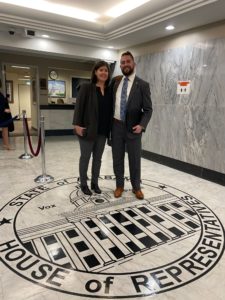POLICY UPDATES
from Alabama Rivers Alliance
|
|
|
|
| Spring has more than sprung, and Alabama is buzzing with another regenerative season. Our native Oakleaf hydrangea is flowering, the turtles are basking in longer days of sunshine along our river banks, and we hope you’re flourishing right along with Alabama’s flora and fauna. I got to revel in some of this natural beauty recently as I paddled and camped on the upper Tallapoosa in the company of kingfishers, red-eared sliders, redbreast sunfishes, and sycamores.
The Alabama State House has ceased buzzing for now as our officials hit the campaign trail, but this year’s session was far from the sleepy election-year cycle that some had predicted. Enjoy our recap of many of the environmental policies considered by the legislature below, along with updates on many of our long-standing policy campaigns. |
|
| Also, please join me in extending a very warm welcome to our new Advocacy Assistant, Victoria Miller, who just started with us after completing two years of inspiring work with our partners at Coosa Riverkeeper. Victoria is an issue expert on fish consumption advisories and fish tissue sampling, so be on the lookout as Victoria continues to be a rising star in our community of environmental advocates!
– Jack West, Policy and Advocacy Director
|
|
|
 Jack and Victoria outside the ARA office in Birmingham |
|
|
ALABAMA LEGISLATIVE SESSION 2022 RECAP
|
|
|
|
| With all Alabama legislators up for reelection this year, the legislative session began and ended early with lawmakers anxious to hit the campaign trail. With record state revenues, the legislature increased funding for education, passed tax cuts, and allocated federal funds from the American Rescue Plan to invest in water and sewer infrastructure and broadband.
Before and during each legislative session, we work with our partners to stay apprised of new bills that could negatively impact Alabama’s environment, and we help amplify policies that protect and promote clean water, air, soil, and energy. Here is a rundown from an environmental perspective of what did and didn’t pass in the 2022 legislative session: |
|
- We worked with legislators to craft a resolution creating an infrastructure investment oversight commission to ensure that funding for water and wastewater infrastructure coming into the state from the federal Infrastructure Investment and Jobs Act gets to the communities who need it most. Representative Neil Rafferty (D-54) spearheaded and introduced the resolution (HJR199), which passed with bipartisan support in the House. Unfortunately, the session ended before the Senate could approve the measure. While we are disappointed, other avenues for water and wastewater infrastructure advocacy exist, and we are actively working with the relevant agencies and the Governor’s office. Click here to read more about the resolution.
|
|
|
 Cindy Lowry and Representative Neil Rafferty (D-54) at the State House. |
|
|
- An ill-conceived bill to require the Department of Conservation and Natural Resources (DCNR) to issue commercial paddlefish licenses (HB334) did not pass. As recent scientific study shows, paddlefish populations in Alabama have not recovered after decades of overfishing of this species, and the Tennessee River in particular is not home to a sustainable population of paddlefish that would support commercial harvest.
- Lawmakers met during a special session in January to allocate $772 million in pandemic relief funds from the American Rescue Plan Act to a variety of water and sewer infrastructure projects, broadband expansion, and health care reimbursements (special session HB1). The legislature put $225M towards clean water infrastructure and sewer upgrade projects, with up to $120M of that amount designated for emergency or high-need projects and up to $5M set aside for decentralized wastewater system demonstrations in the Black Belt where many rural residents do not have adequate access to sanitation equipment and services.
- The critical energy infrastructure bill (also known as the “drone bill”) (SB17) which had been introduced in previous sessions did eventually pass this year. However, thanks to the prior work of SELC and other partners, the law does not limit the use of drones to monitor pollution.
- The land ownership restriction bill that would have limited ownership of Alabama’s agricultural and forest land to US citizens (SB14) was put on hold by its sponsor after meeting resistance.
- The anti-protest bill (HB2) that sought to change the definition of riot under state law and increase criminal penalties for “rioters” did not pass. Many environmental and social justice groups feared this measure could affect the public’s ability to peacefully demonstrate and protest.
- A bill that would promote access to clean drinking water in schools and provide students reusable water bottles to reduce plastic waste (HB96) was re-introduced this session but did not make it through.
- A bill proposing that income from carbon credits generated from the management of Forever Wild properties in the state go to the county general funds where those properties are located (HB65) did not pass, nor did a similar bill specific to Coosa County (HB463).
|
|
|
|
REFORM OF WASTE SLUDGE REGULATIONS
|
|
| Waste sludges from wastewater treatment plants, poultry processing operations, pulp and paper facilities, and other industrial sources continue to be spread as “beneficial fertilizer” onto Alabama farmland, threatening nearby creeks with polluted runoff and local residents with disgusting odors.
After tireless work by Alabama Waste Sludge Awareness and a legal challenge to the existing regulations brought by Black Warrior Riverkeeper, Alabama Rivers Alliance, and Southern Environmental Law Center, the Alabama Department of Environmental Management (ADEM) issued new proposed regulations regarding this practice in January. While the new regulations are a step in the right direction, they are not stringent enough to protect our agricultural land, rivers, or public health or prevent our state from being the nation’s dumping destination for a variety of industries to cheaply dispose of wastes.
Together with Black Warrior Riverkeeper and Southern Environmental Law Center, we filed comments urging ADEM to further strengthen the regulations for land-applying waste sludges and not allow today’s fertile fields to be turned into tomorrow’s toxic waste dumps.
The public comment period for these new regulations has come to a close, and the next step is for the Environmental Management Commission to consider and approve the new rules at their June meeting.
To learn more about waste sludge issues in Alabama, the Sierra Club is hosting a webinar with ARA board member Julie Lay on June 2. Click here for more details. |
|
HARRIS DAM HYDROPOWER RELICENSING
|
|
 Last November, Alabama Power filed its final license application for the relicensing of Harris Dam on the Tallapoosa River. Over the past six months, the Federal Energy Regulatory Commission (FERC) issued a deficiency letter and additional information requests to the utility seeking more information before finalizing the application. As part of its final license application, Alabama Power is proposing to install and operate a new smaller continuous minimum flow turbine at Harris Dam. Last November, Alabama Power filed its final license application for the relicensing of Harris Dam on the Tallapoosa River. Over the past six months, the Federal Energy Regulatory Commission (FERC) issued a deficiency letter and additional information requests to the utility seeking more information before finalizing the application. As part of its final license application, Alabama Power is proposing to install and operate a new smaller continuous minimum flow turbine at Harris Dam.
In April, FERC accepted Alabama Power’s license application for review, and in the next few months the agency will begin its environmental assessment of the hydropower project and the utility’s proposed future plans. FERC has issued a public notice allowing stakeholders to file motions to intervene in the docket and become formal parties to the procedure. The deadline for filing motions to intervene is June 13, 2022, and you can reach out to Alabama Rivers Alliance if you are interested in becoming an intervenor.
For more information about the relicensing and to view our Southern Exposure film, Heal the River, about the relicensing of Harris Dam and its impacts on the people and river downstream, please visit www.HealtheRiver.com. To view many of the filings and studies, you can access Alabama Power’s site at www.harrisrelicensing.com. |
|
|
|
- Low Income Household Water Assistance Program (LIHWAP) – For the past two years, the Alabama Rivers Alliance has advocated for assistance to water customers who may have fallen behind on bill payments. Temporary funding was allocated as part of the pandemic relief bills from the federal government, and we commented on the development of the program that was created to distribute those funds. The LIHWAP is now up and running. For more information on the program and on how to access the funds, click here.
- Water infrastructure funding and advocacy – According to an Alabama Department of Environmental Management press release, “In a Special Session in January called by Gov. Kay Ivey, the Alabama Legislature approved spending $225 million out of the state’s ARPA funding to help public water and sewer systems with the greatest infrastructure needs as well as individual residents in need of water or sewer services. Included is funding specifically set aside for several trial projects to address unique sewer problems in the Black Belt that have plagued families for generations.” Additionally, according to the EPA, Alabama will receive $20,065,000 for the Clean Water State Revolving Fund (CWSRF) and $38,705,000 for the Drinking Water State Revolving Fund (DWSRF) in 2022 from the Infrastructure Investment and Jobs Act (IIJA). Additional funds will continue to come from the IIJA for the next 5 years, and under the law, 49% of the SRF funds must go to disadvantaged communities. ADEM has created a website containing information about the hundreds of applications the agency has received for this funding. This site is updated every week on Fridays.
The Alabama Rivers Alliance has convened local, state, and national advocates working on water infrastructure in Alabama to plan administrative and legislative advocacy to monitor the distribution of the federal infrastructure dollars, analyze and comment on applications to the SRF programs, and advocate where needed to ensure the funds are getting to disadvantaged communities. We are working to identify and call out (if necessary) technical assistance gaps in the state’s process and advocate for a proactive and transparent process in the distribution of these funds. |
|
|
|
| The Alabama Rivers Alliance participates in a number of national coalitions, including River Network, Clean Water for All, Clean Water Network, and the Hydropower Reform Coalition. We sign-on to letters of support and action alerts on issues that our national partners recommend, and we pass along these opportunities to other Alabama groups who are part of our Alliance. Some of the following updates are from our national partners. |
|
WATERS OF THE U.S. (WOTUS) – CLEAN WATER ACT
|
|
| Last July, the Environmental Protection Agency (EPA) and the U.S. Army Corps of Engineers (USACE) announced stakeholder engagement opportunities, including the agencies’ intent to host ten regionally focused roundtables to craft a new definition of what waters qualify as “Waters of the U.S.” for purposes of Clean Water Act protection. The roundtables selected by the agencies are scheduled over the next month, and the first panel has already taken place. You can find the upcoming roundtable schedule here and join in via the livestream links.
SPECIAL NOTE: one of the two Southeast roundtables is being held at Cahaba Brewing in Birmingham on June 7! Click here for more information.
At the same time, environmental organizations are evaluating how they can weigh in via amicus briefs in the upcoming Sackett v. EPA litigation. This case is an opportunity for some members of the Supreme Court to severely restrict the definition of “Waters of the US” and therefore restrict the reach of the Clean Water Act. The petitioners are arguing that the court should adopt the “relatively permanent” connection test (articulated by Justice Scalia in the landmark Rapanos case and the basis for the “Dirty Water Rule” put in place by the former administration), which essentially says that for a water to be a “WOTUS” the surface connection must be relatively permanent. |
|
SECTION 401 OF THE CLEAN WATER ACT
|
|
| The Supreme Court granted a request by industry and red-state intervenors to stay (i.e., pause) a district court’s decision vacating the Trump-era section 401 Water Quality Certification rule. This means that the Trump-era rule is now back in effect until an EPA replacement is finalized, presumably in a few months.
As a refresher, Section 401 of the Clean Water Act gives states and some tribes the ability to review the impacts that projects requiring federal permits (from boat docks to hydro dams to pipelines) may have on their local, state, or tribal water quality. States or tribes must provide a “certification” before the permits get processed. Thousands of these have been issued every year for decades. Under the prior administration, the EPA, responding to industry concerns, issued a rule changing their interpretation of Section 401 to make it easier for industry permittees to obtain these permits without interference from States or Tribes concerned with water quality impacts.
Environmental groups recently met with the White House Office of Management and Budget regarding the Biden EPA’s soon-to-be-proposed rule on implementation of Section 401 of the Clean Water Act, emphasizing the importance of restorative reforms to states, tribes, the environment, and environmental justice, as well as the importance of timeliness given the weakened 401 rule is currently in effect. |
|
DEPARTMENT OF JUSTICE ENVIRONMENTAL JUSTICE STRATEGY
|
|
|
The Department of Justice recently announced its comprehensive environmental justice strategy (press release here, full enforcement strategy text here). The highlight of the agency’s plan is the creation of a new Office of Environmental Justice within the DOJ’s Environment section to implement the enforcement arm of the strategy. The strategy was jointly announced by Attorney General Merrick Garland and EPA Administrator Michael Regan. The plan commits to prioritizing cases that will reduce public health and environmental harms to overburdened and underserved communities and includes pursuit of timely and effective remedies in enforcement matters such as mitigation, Supplemental Environmental Projects, preliminary and interim relief to help affected communities, and increased focus on pursuit of Tribal environmental justice. It also commits to transparency and outreach to communities. |
|
ARMY CORPS OF ENGINEERS – ENVIRONMENTAL JUSTICE GUIDANCE
|
|
| The Army Corps of Engineers recently released guidance on Environmental Justice. In his memorandum to the Army Corps, the Assistant Secretary outlined the need to modernize the Civil Works program to better serve the needs of disadvantaged communities. By incorporating environmental justice initiatives into the Civil Works program, the Corps hopes to build innovative, climate-resilient infrastructure that protects communities and ecosystems throughout the country from the impacts of climate change. |
|
WATER RESOURCES DEVELOPMENT ACT
|
|
| The bipartisan, biannual US Army Corps of Engineers (USACE) legislation known as the Water Resources Development Act (WRDA) continues to move through the legislative process. Most recently, the Senate Environment and Public Works committee unanimously advanced a version of the legislation to the floor. Though this WRDA bill is more focused on authorizing USACE projects rather than policy reforms, we should expect fact sheets from the committee soon on some climate and environmental justice provisions included in the bill. In the meantime, here is a section by section of the bill, and here is a one pager. On the House of Representatives side of WRDA, negotiations on text remain ongo |
|
|
|
| Support our policy and advocacy work by joining as a member, making a donation, taking actions when asked and sharing our updates with your family and friends. Click the icons below to share this policy update on social media or via email with your network, friends and neighbors! |
|
|
|